For the 2025 school year, there is 1 public preschool serving 599 students in Marion County School District. This district's average pre testing ranking is 3/10, which is in the bottom 50% of public pre schools in Georgia.
Public Preschool in Marion County School District have an average math proficiency score of 29% (versus the Georgia public pre school average of 41%), and reading proficiency score of 29% (versus the 39% statewide average).
Minority enrollment is 49% of the student body (majority Black), which is less than the Georgia public preschool average of 65% (majority Black).
Overview
This School District
This State (GA)
# Schools
2 Schools
1,169 Schools
# Students
1,294 Students
724,977 Students
# Teachers
80 Teachers
53,908 Teachers
Student : Teacher Ratio
16:1
16:1
District Rank
Marion County School District, which is ranked within the bottom 50% of all 222 school districts in Georgia (based off of combined math and reading proficiency testing data) for the 2021-2022 school year.
The school district's graduation rate of 85-89% has stayed relatively flat over five school years.
Overall District Rank
#150 out of 222 school districts
(Bottom 50%)
(Bottom 50%)
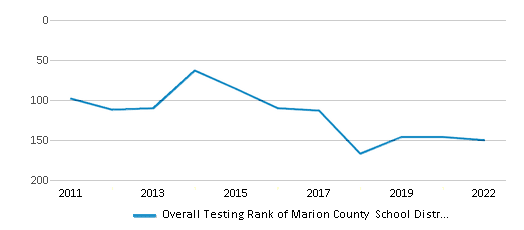
Math Test Scores (% Proficient)
26%
37%
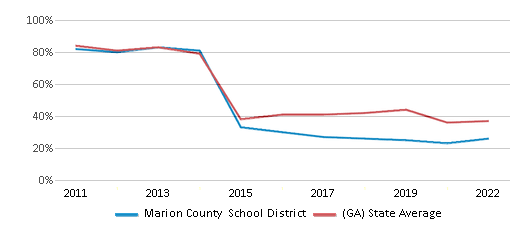
Reading/Language Arts Test Scores (% Proficient)
31%
40%
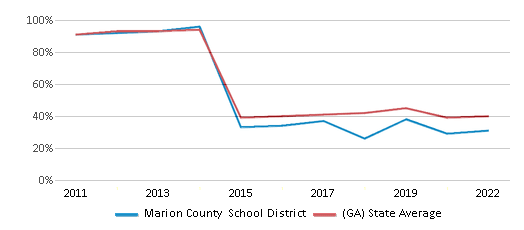
Science Test Scores (% Proficient)
33%
40%
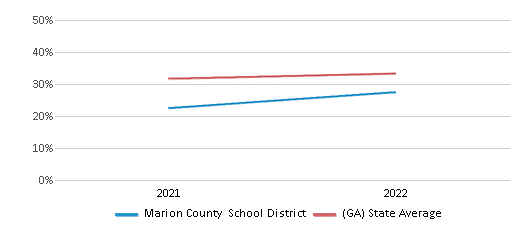
Graduation Rate
85-89%
84%
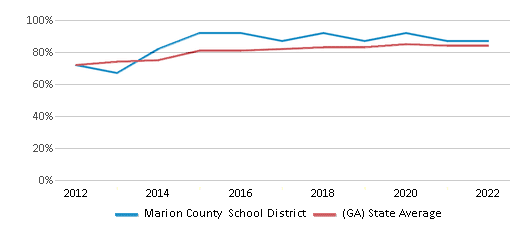
Students by Ethnicity:
Diversity Score
0.63
0.72
# American Indian Students
n/a
1,833 Students
% American Indian Students
n/a
n/a
# Asian Students
10 Students
37,193 Students
% Asian Students
1%
5%
# Hispanic Students
187 Students
140,749 Students
% Hispanic Students
14%
20%
# Black Students
391 Students
254,068 Students
% Black Students
30%
35%
# White Students
667 Students
251,423 Students
% White Students
52%
35%
# Hawaiian Students
n/a
675 Students
% Hawaiian Students
n/a
n/a
# Two or more races Students
39 Students
39,036 Students
% of Two or more races Students
3%
5%
Students by Grade:
# Students in PK Grade:
68
50,325
# Students in K Grade:
95
111,016
# Students in 1st Grade:
83
115,378
# Students in 2nd Grade:
94
117,370
# Students in 3rd Grade:
89
105,120
# Students in 4th Grade:
87
105,404
# Students in 5th Grade:
83
104,855
# Students in 6th Grade:
98
3,740
# Students in 7th Grade:
99
2,937
# Students in 8th Grade:
107
3,170
# Students in 9th Grade:
115
1,490
# Students in 10th Grade:
102
1,554
# Students in 11th Grade:
90
1,408
# Students in 12th Grade:
84
1,210
# Ungraded Students:
-
-
District Revenue and Spending
The revenue/student of $13,864 in this school district is less than the state median of $14,305. The school district revenue/student has stayed relatively flat over four school years.
The school district's spending/student of $12,156 is less than the state median of $13,431. The school district spending/student has stayed relatively flat over four school years.
Total Revenue
$18 MM
$24,999 MM
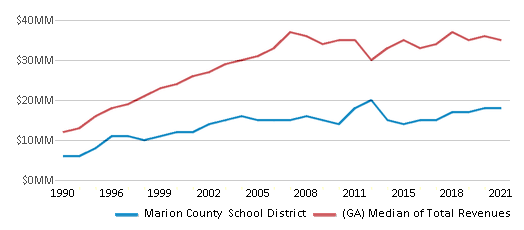
Spending
$16 MM
$23,473 MM
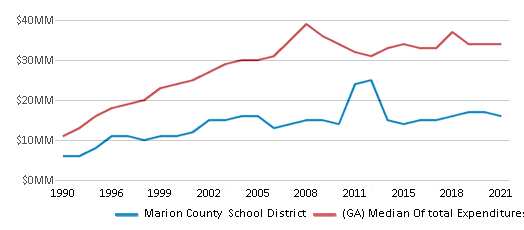
Revenue / Student
$13,864
$14,305
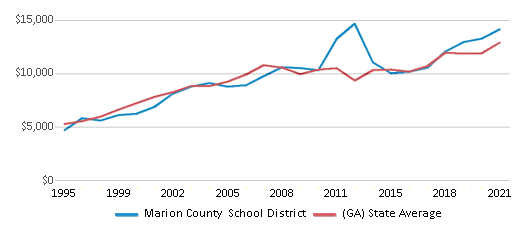
Spending / Student
$12,156
$13,431
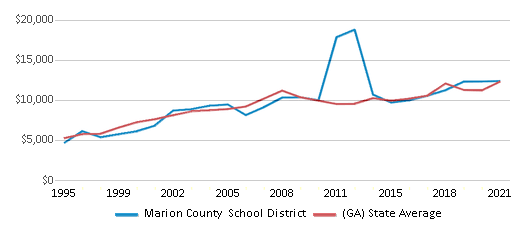
Best Marion County School District Public Preschools (2025)
School
(Math and Reading Proficiency)
(Math and Reading Proficiency)
Location
Grades
Students
Rank: #11.
L. K. Moss Elementary School
(Math: 29% | Reading: 29%)
Rank:
Rank:
4/
Bottom 50%10
1707 Pineville Rd
Buena Vista, GA 31803
(229) 649-5567
Buena Vista, GA 31803
(229) 649-5567
Grades: PK-5
| 599 students
Recent Articles

What Is A Charter School?
Explore the world of charter schools in this comprehensive guide. Learn about their history, how they operate, and the pros and cons of this educational innovation. Discover key facts about charter schools, including admission policies, demographics, and funding, as well as what to look for when considering a charter school for your child.

10 Reasons Why High School Sports Benefit Students
Discover the 10 compelling reasons why high school sports are beneficial for students. This comprehensive article explores how athletics enhance academic performance, foster personal growth, and develop crucial life skills. From improved fitness and time management to leadership development and community representation, learn why participating in high school sports can be a game-changer for students' overall success and well-being.

February 05, 2025
Understanding the U.S. Department of Education: Structure, Impact, and EvolutionWe explore how the Department of Education shapes American education, from its cabinet-level leadership to its impact on millions of students, written for general audiences seeking clarity on this vital institution.





